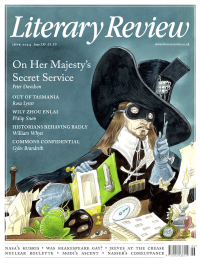Jonathan Boff
Fighting Talk
Why War?
By Richard Overy
Pelican Books 400pp £22
On 15 December 1969, cities all over the world woke up to billboards proclaiming, ‘War is Over!’ Paid for by John Lennon and Yoko Ono, the advertisement was not, of course, meant as a statement of fact. It was an appeal to stop the fighting and dying in Biafra and Vietnam. As ever, you had to read the small print beneath the banner headline: ‘If you want it.’ Lennon and Ono were using the techniques of selling soap to promote peace over the rival brand of war. Their logic was simple: if each one of us rejected war, we could together put an end to it. How could anyone sane want anything other than the end of war?
For Vietnam and Biafra then, read Ukraine and Gaza now. The question remains as tragically relevant today as it was in 1969, or in 1935, when eleven million British voters signed the Peace Ballot, or at the end of the 18th century, when Jeremy Bentham and Immanuel Kant made their proposals for ‘perpetual peace’. It is the question that Richard Overy asks in Why War?. The title comes from a famous correspondence between Albert Einstein and Sigmund Freud that took place in 1932. Overy, a distinguished historian of the Second World War, explores how the discourse on war has developed since then. This is a work of history, therefore, but one that seeks to uncover the general principles that drive the human resort
to war rather than the origins of particular conflicts.
Overy has set himself a formidable task, and one he only makes harder for himself by adopting a very broad definition of warfare as ‘collective, purposive, lethal, intergroup violence’. He must explain not only why collectives such as clans, tribes and states go to war, but also what motivates individuals

Sign Up to our newsletter
Receive free articles, highlights from the archive, news, details of prizes, and much more.@Lit_Review
Follow Literary Review on Twitter
Twitter Feed
'A charming and amusing personal history'
Don't miss this brilliant @Lit_Review review of #WorldCupFever 👇
@KuperSimon's must-read footballing journey in nine tournaments is out now ⚽️🏆
Michael Taylor - The Beautiful Game
Michael Taylor: The Beautiful Game - World Cup Fever: A Footballing Journey in Nine Tournaments by Simon Kuper; Th...
literaryreview.co.uk
In the summer of 1918, the Caspian port of Baku played host to a remarkable group of Allied soldiers, sent to defend oil wells against the Ottomans.
Anna Reid recounts their escapades.
Anna Reid - Mission Impossible
Anna Reid: Mission Impossible - Mavericks: Empire, Oil, Revolution and the Forgotten Battle of World War One by Nick Higham
literaryreview.co.uk
Alfred, Lord Tennyson is practically a byword for old-fashioned Victorian grandeur, rarely pictured without a cravat and a serious beard.
Seamus Perry tries to picture him as a younger man.
Seamus Perry - Before the Beard
Seamus Perry: Before the Beard - The Boundless Deep: Young Tennyson, Science, and the Crisis of Belief by Richard Holmes
literaryreview.co.uk